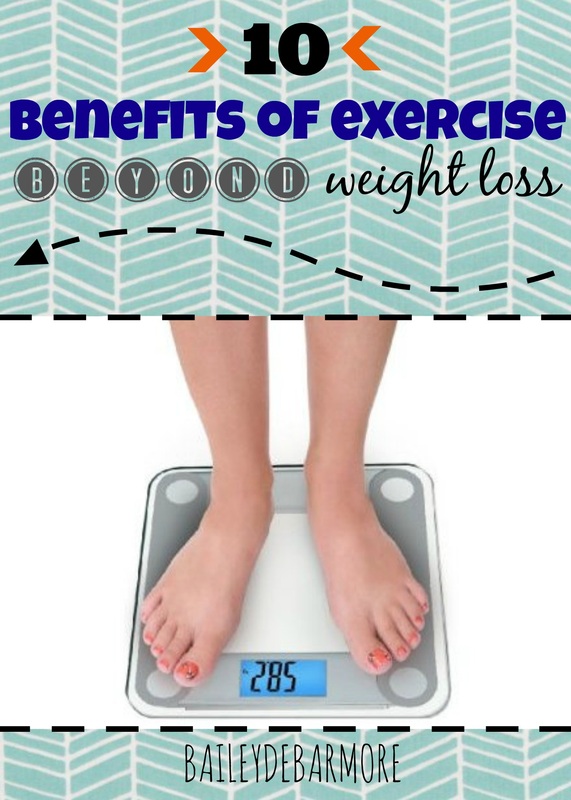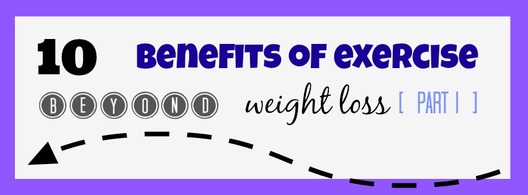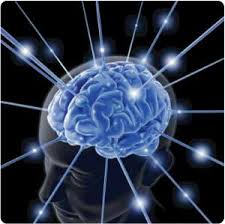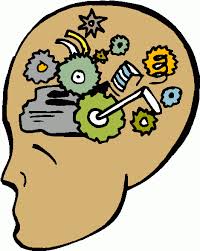Did you miss Part I: Benefits for Your Body? Click! We're back on the topic of benefits of exercise beyond weight loss. Earlier this week I talked about 5 benefits for your body in part one. For part two, we're going to talk about 5 benefits to your brain! 5 Benefits for Your Brain (1) Stress relief Last week, I talked about 10 reasons you may not be losing weight and #4 was living with persistent, chronic stress. I provided a number of ideas to help relieve stress, but now I'm going to talk specifically about exercise. When you are chronically stressed, you have chronically high levels of cortisol (stress hormone) instead of normal fluctuations that let your body relax and perform, relax and perform, and repeat. This hormonal picture sets the stage for weight gain and weight retention. When you exercise, your body releases cortisol, but I'm going to call this the "exercise response". The cortisol helps your body adapt to the increased workload and provide your muscles and heart with fuel. When you stop exercising, the cortisol returns to baseline (in theory). Regular exercise can help manage the chronic stress response, teaching your body how to move its cortisol levels up and down instead of having them remain elevated (1).
(2) Improved memory
(3) Better mood
(4) Sleep better There's been a bit of Internet chatter lately on sleep and exercise, particularly at night. Some argue that exercise at night helps you fall asleep, while others say it wakes your body up. In sum, both sides are right. Its a complicated relationship between sleep and exercise, and highly individualized. For people without insomnia, it can be generalized that when you work out you fatigue your body and mind and sleep more soundly and through the night (6). Long term exercise plans and their effect on suppressing the body's stress response may play a role in sleeping better as well!
(5) Learn quicker Similar to the benefits of exercise on memory, as the growth hormone release generates new brain cells, it also helps to generate new connections. Scientists previously thought that our brains only had extremely active brain connections in childhood, and then in moderation as we learned through adolescence, and decreased in adulthood (2)-(4). This is why children can learn foreign languages so much quicker than adults. But research is now uncovering the idea of adult regeneration to make new pathways. So if you are trying to adopt a new habit or learn something new (or if you're a student!) exercise can help you learn. It also improves your focus, which makes you more productive while you learn!
What problem do you have that you think could be helped by exercise? -Bailey References:
(1) Klaperski S, Von Dawans B, Heirnirchs M, Fuchs R. Does the level of physical activity affect physiological and psychological responses to psychosocial stress in women? Pysch of Sport and Exercise. March 2013. Vol 14:2; 266-274. (2) Kang EB, Kwon IS, Koo JH, Jang YC, Lee J, Cho IH, Lee Y, Cho JY. Treadmill exercise represses neuronal cell death and inflammation during amyloid beta-induced ER stress by upregulating unfolded protein response in aged presenlinin 2 mutant mice. FAEB. 2013. Vol 27. (3) Spesiman RB, Kumar A, Rani A, Foster TC, Ormerod B. Daily exercise improves memory, stimulates hippocampal neurogenesis, and modulates immune and neuroimmune cytokines in aging rates. Neurogenesis and Inflammation. Feb 2013; Vol 28. pg 25-43. (4) Sith AM, Speigler KM, Sauce B, Wass CD, Sturzoiu T, Matzel LD. Voluntary aerobic exercise increases the cognitive enhancing effects of working memory training. Behavioral Brain Research 2013;256:626-635. (5) Mata J, Hogan CL, Joormann J, Waugh CE, Gotlib IH. Acute exercise attenuates negative affect following repeated sad mood inductions in persons who have recovered from depression. J of Abnormal Pysch. Feb 2013;Vol 122(1):45-50. (6) Reynolds G. How exercise can help us sleep better. New York Times. August 21 2013. http://well.blogs.nytimes.com/2013/08/21/how-exercise-can-help-us-sleep-better/
0 Comments
Your comment will be posted after it is approved.
Leave a Reply. |
a blog about health, wellness, nutrition, and fitness from an epidemiologist / dietitian with personal trainer experience
Stay up to date on productivity tips and active learning techniques
Like what you read?
categories
All
|









_250px.png)



 RSS Feed
RSS Feed
